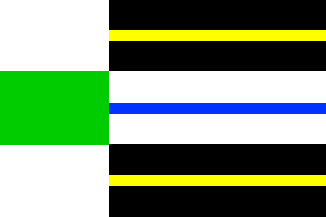 Shipmate Flagchart : http://www.flagchart.net
Shipmate Flagchart : http://www.flagchart.net
adoption date: unknown. Design: Stichting Banistiek en Heraldiek.

Last modified: 2018-12-15 by rob raeside
Keywords: stadskanaal |
Links: FOTW homepage |
search |
disclaimer and copyright |
write us |
mirrors
 Shipmate Flagchart : http://www.flagchart.net
Shipmate Flagchart : http://www.flagchart.net
adoption date: unknown. Design: Stichting Banistiek en Heraldiek.
![[Stadskanaal old flag]](../images/n/nl-gr_sk.gif) image by Jarig Bakker, 14 Aug 2003
image by Jarig Bakker, 14 Aug 2003
Stadskanaal is a relatively new municipality in Groningen province in the Netherlands. During the municipal reorganization of 1969 the municipality of Onstwedde was renamed Stadskanaal, after the largest settlement. Onstwedde did not have a flag, but it did have a Coat of Arms, which became the Coat of Arms of the new municipality. The "Stichting Banistiek en Heraldiek" designed a new flag.
However Stadskanaal already had a local flag. Description: Diagonally
divided red and yellow, with a narrow blue dividing line; on the red part
a white jumping horse.
This was a semi-official local flag: Stadskanaal was part of two municipalities:
Ontstwedde and Wildervank. Two local societies (Commissie Verfraaiing
Stadskanaal,
and Algemene Handelsvereniging) adopted a design in May 1960. The
red part symbolizes the hard work in the peat-industry (which also occurs
in the Coat of Arms of Wildervank); the fertile
cornfields (cornsheaves occur on the Coat of Arms of Onstwedde) have been represented
by the yellow field. The diagonal blue line points at the system of canals
characterizing the "Veenkoloniën" (peat-colonies), especially Stadskanaal.
The white Saxon horse symbolizes activity, power and pride of the region,
of which Stadskanaal is the center.
Source: Sierksma's Nederlands Vlaggenboek, 1962 [sie62]
Note: Stadskanaal is the name of the place, but also of the canal running
through the place, all the way to "Staad", which is Groningen
city.
Jarig Bakker, 14 Aug 2003